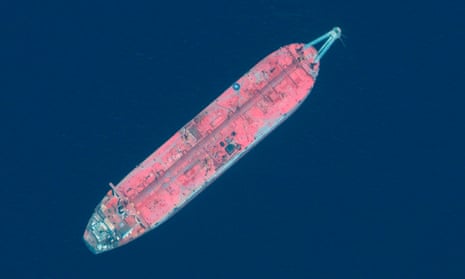A rare UN appeal to the public to raise $20m is to be launched on Tuesday in an attempt to prevent an environmental catastrophe caused by the potential break-up of an oil tanker off the coast of Yemen.
The money is needed to offload more than 1.14m barrels of oil that have been sitting in the decrepit cargo ship, Safer, for more than six years because of an impasse between Houthi groups and the Saudi-backed government over ownership and responsibility.
The UN is in a race against time because the oil transfer needs to be completed by the winter when the currents and winds increase, raising the risk of the vessel breaking up and pouring the oil into the Red Sea.
The UN’s resident coordinator for Yemen, David Gressly, admitted the resort to an appeal to the general public was unusual, but said the UN needed the money by the end of the month, saying: “It was do-able but it is going to take a push; $20m is not a lot if you consider the estimated $20bn cost of a clean-up alone.”
He admitted legal and budgetary constraints have made it difficult for some countries to contribute: “It is far easier to raise funds to respond to a catastrophe than to prevent a catastrophe.”
Gressly warned: “We are taking a chance this ship will break up every day we delay. We are running out of time. We are rolling the dice every day.” He said it was a certainty that the ship would break up soon, and the Safer’s captain had told him it was only a miracle that had prevented the disaster last winter.
Any delay into July means the four-month operation would not be complete by the time the winds and currents strengthen dangerously from November onwards.
The appeal to the public underlines how reluctant cash-strapped countries are to give money at present.
The UN has so far only raised $60m from member states as part of a complex operation to remove the oil and then sell it on the open market. The estimated total cost of all the stages of the clean-up is put at $144m, but countries have so far failed to stump up the cash.
Disputes between the Houthi rebel forces and the UN-recognised government in Yemen over the proceeds of the oil’s sale, and the need for a replacement vessel, have prevented the UN from acting, but officials now say these political and security issues have either been resolved or deferred, meaning the hold-up is only being caused by a lack of resources to fund the rescue.
A special UN appeal conference in May took the funding to $40m, but then the US and Saudi Arabia each contributed a further $10m, leaving the UN $20m short of the money it needs to complete the first stage of preparing the ageing vessel for the oil transfer.
Gressly said any spillage would have a catastrophic environmental impact on the Red Sea, including 20,000 fishery livelihoods, the ability to access ports that deliver commercial and humanitarian food to Yemen, and Red Sea shipping channels. He warned fishing stocks would be damaged for 25 years.
